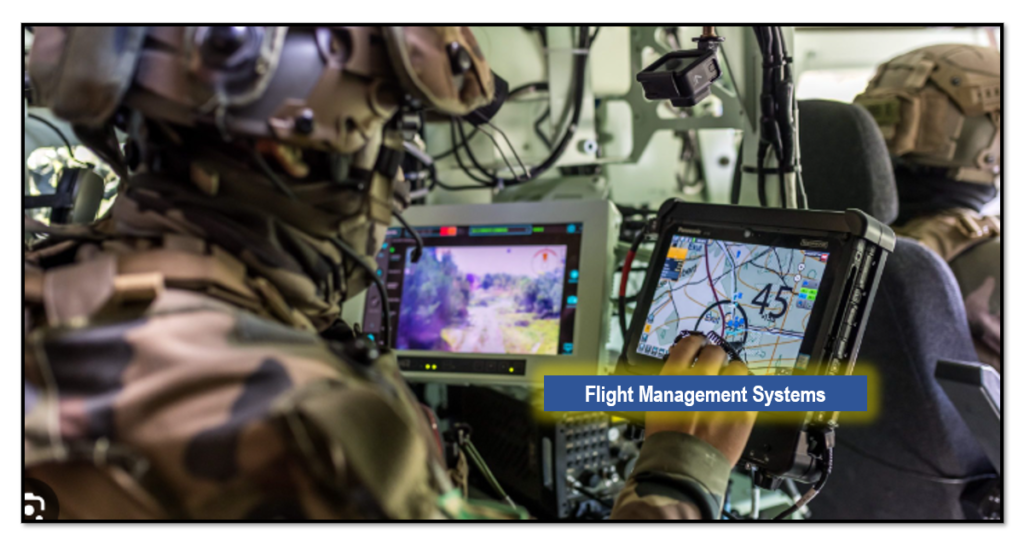Flight Management System (FMS) Engineer possess expertise in aircraft guidance, navigation, control, and flight performance optimization. In an Aerospace and Defence Manufacturing Company plays a crucial role in designing, developing, testing, and maintaining the FMS, a critical component of modern avionics systems.

Their primary responsibilities encompass:
FMS Design and Development: FMS Engineers collaborate with design teams to conceptualize, design, and develop the FMS architecture, including software algorithms, hardware interfaces, and system integration. They consider factors such as safety, reliability, performance, and user interface requirements.
Guidance, Navigation, and Control Algorithms: FMS Engineers develop and optimize algorithms for aircraft guidance, navigation, and control. They utilize principles of control theory, navigation techniques, and sensor fusion to ensure accurate and precise aircraft positioning, trajectory management, and flight path control.
Flight Performance Optimization: FMS Engineers develop algorithms and strategies for flight performance optimization, including fuel efficiency, noise reduction, and time management. They consider factors such as weather conditions, airspace constraints, and mission objectives to optimize flight profiles and reduce operational costs.
FMS Testing and Validation: FMS Engineers conduct thorough testing and validation of the FMS software and hardware to ensure its functionality, performance, and safety. They employ various testing methodologies, including unit testing, integration testing, and system testing, in both simulated and real-flight environments.
FMS Certification and Regulatory Compliance: FMS Engineers assist in obtaining necessary certifications and ensuring compliance with aviation regulations and safety standards. They prepare documentation, conduct audits, and address any regulatory concerns to ensure the FMS meets industry requirements.
FMS Maintenance and Updates: FMS Engineers maintain and update the FMS throughout its operational life, addressing software bugs, implementing new features, and adapting to changing aviation regulations and technologies. They provide technical support to aircraft operators and maintainers to ensure the FMS functions optimally.
Continuous Improvement and Innovation: FMS Engineers stay abreast of advancements in guidance, navigation, control, and flight performance optimization technologies. They actively participate in research and development initiatives to introduce innovative solutions that enhance the FMS’s capabilities, performance, and reliability.
Collaboration with Other Engineering Disciplines: FMS Engineers collaborate closely with other engineering disciplines, such as avionics, aerodynamics, and propulsion, to ensure seamless integration of the FMS into the overall aircraft system. They also work with flight crew training teams to ensure effective utilization of the FMS by pilots and other flight crew members.
Overall, Flight Management System Engineers play a critical role in the aerospace and defense industries, ensuring the safe, efficient, and precise operation of modern aircraft. Their expertise in guidance, navigation, control, and flight performance optimization is essential for the success of critical missions and the advancement of aviation technologies.
Companies a Flight Management System Engineers Engineer can work for:
Flight Management System Engineers can work for the following companies:
Airbus:
Boeing: FMS engineers at Boeing are responsible for developing software for the FMS of Boeing aircraft, such as the 787 Dreamliner and the P-8 Poseidon.
Collins Aerospace: FMS engineers at Collins Aerospace are responsible for developing software for the FMS of Collins Aerospace systems, such as the TCAS II collision avoidance system and the Pro Line Fusion avionics suite.
Honeywell Aerospace: FMS engineers at Honeywell Aerospace are responsible for developing software for the FMS of Honeywell Aerospace systems, such as the Primus Epic avionics suite and the SmartPath FMS.
L3Harris Technologies: FMS engineers at L3Harris Technologies are responsible for developing software for the FMS of L3Harris Technologies systems, such as the Integrated Flight Control System (IFCS) and the Tactical Navigation System (TNS).
Thales Group: FMS engineers at Thales Group are responsible for developing software for the FMS of Thales Group systems, such as the TopSky FMS and the TopFlight mission planning system.
Rockwell Collins: FMS engineers at Rockwell Collins are responsible for developing software for the FMS of Rockwell Collins systems, such as the Pro Line Fusion avionics suite and the ARINC 429 data bus.
General Electric Aviation: FMS engineers at GE Aviation are responsible for developing software for the FMS of GE Aviation systems, such as the FADEC engine control system and the Flight Management Guidance System (FMGS).
United Technologies Aerospace Systems: FMS engineers at United Technologies Aerospace Systems are responsible for developing software for the FMS of United Technologies Aerospace Systems, such as the F135 engine control system and the Integrated Avionics Suite (IAS).
Safran Electronics & Defense: FMS engineers at Safran Electronics & Defense are responsible for developing software for the FMS of Safran Electronics & Defense systems, such as the Sigma 40/40E FMS and the Thales TopSky FMS.
Basic Qualifications:
Aerospace Engineering: This degree provides a strong foundation in the principles of aerodynamics, propulsion, structures, and control systems, all of which are essential for understanding the operation of FMS. This degree should have a focus on the design and development of electronic systems for aircraft, including FMS. Students will learn about avionics hardware, software, and integration.
Software Expertise:
There is no job today which does not need software expertise.
Here is a list:
Flight Management System (FMS) software: This specialized software is the heart of the FMS and handles tasks such as navigation, performance calculations, and flight planning. FMS engineers should be familiar with the specific FMS software used by their employer and be able to understand and modify its code.
Avionics software development tools: FMS engineers need to be proficient in the use of avionics software development tools, including compilers, debuggers, and testing frameworks. These tools are essential for creating, testing, and debugging avionics software.
Real-time operating systems (RTOS): RTOSs are specialized operating systems designed for real-time applications, such as FMS. FMS engineers should understand how to use RTOSs to achieve the high performance and reliability required for FMS software.
Aircraft data bus standards: FMS engineers need to be familiar with aircraft data bus standards, such as ARINC 429 and ARINC 664. These standards define how different avionics systems communicate with each other, including the FMS.
Modeling and simulation tools: Modeling and simulation tools are used to create virtual models of aircraft systems, including the FMS. FMS engineers can use these tools to test and validate FMS software without the need for physical testing.
Universities and Colleges offering Courses in Workflow:
There are several in India:
- Indian Institute of Technology, Madras (IITM): Offers B.Tech in Avionics, M.Tech in Avionics, and Ph.D. in Avionics.
- Indian Institute of Space Science and Technology (IIST), Thiruvananthapuram: Offers B.Tech in Avionics and M.Tech in Avionics.
- Hindustan Institute of Technology and Science (HITS), Chennai: Offers B.Tech in Avionics.
- Netaji Subhas Institute of Technology (NSIT), Delhi: Offers B.Tech in Avionics.
- College of Engineering, Guindy (CEG), Chennai: Offers M.E in Avionics.
- Bengal Engineering and Science University (BESU), Shibpur: Offers M.Tech in Avionics.
- University Visvesvaraya College of Engineering (UVCE), Bangalore: Offers M.Tech in Avionics.
- M.S. Ramaiah Institute of Technology (MSRIT), Bangalore: Offers M.Tech in Avionics.
Unique features of the Job
- Highly specialized
- High salaries

